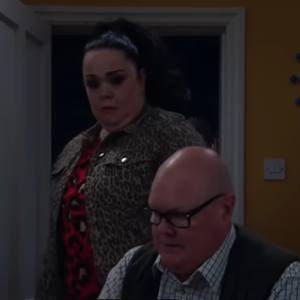Every clue Mack is alive — why the ‘he’s dead’ theory fails | Emmerdale
From the moment McKenzie Boyd staggered into the shadows of that van, struck by an arrow and later struck again by Jon Sugden’s cold, calculating hand, the village collectively held its breath — and yet the most basic question persisted: where is the body? In soap operas, absence can be louder than confession; a wrapped shape under a blanket is never proof enough for a storyteller who delights in misdirection. Fans have been quick to note that Emmerdale’s camera never lingered long enough to provide the definitive finality that a corpse would. There was blood, yes, and there was a blanket that might have concealed a motionless form — but blood stains do not equal evidence when the narrative needs room to breathe. The show has history of vanishing bodies and presumed deaths that turn out to be convoluted escapes or staged disappearances; viewers remember Nate Robinson’s supposed exit and the slow-burn reveal that led back to Jon, and that template suggests the producers know how to play the long game. If the storytellers wanted to close the chapter on Mack forever, they would have given the village and the audience the kind of incontrovertible image that leaves no room for rumor. Instead, the vagueness of the aftermath feels deliberate, a cinematic elbow nudging fans to keep searching for loopholes, and every loophole fans find becomes another reason to insist he’s alive.
The emotional architecture of the story around Charity Boyd leans heavily toward Mack still being out there; there are too many narrative threads that would fray if the marriage were simply to be shuttered by a corpse. Charity’s surrogacy arc with Sarah and Jacob — already riddled with secrets and late-night anxieties — depends on the messy moral territory of infidelity, denial and the consequences of hidden truths. If Mack were truly dead, the writers would have removed a potent source of tension: the possibility that Charity’s baby might be Ross’s, that she could be living in the aftermath of a husband who vanished rather than a husband who was murdered. Soap dramas thrive on suspended reckonings — the kind that make characters habitually misstep and make viewers compulsively tune in. A living Mack who is silent, missing, or even trapped somewhere, allows Charity’s lies and reconciliations to develop into devastating revelations later down the line. It would be a tidy but boring move to make him dead now and for all. Keeping him alive — or at least ambiguous — keeps the marriage, the jealousy, and the explosive paternity stakes in play, which is exactly the state of tension Emmerdale needs to sustain the next wave of episodes.
There are echoes of Nate’s fate ringing through Mack’s disappearance and those echoes are uncomfortable for anyone ready to pronounce finality. Last autumn, Nate Robinson slipped away only for the truth of his fate to surface like an unwelcome tide, pulling reputations under and exposing how lies can be softened into a lie everyone accepts — until they don’t. That arc demonstrated Jon Sugden’s chilling ability to construct narratives around absent men: make them appear as runaway, build a consensus of grief and then reveal a forensic cruelty sewn into the seams of everyday life. Fans who watched Nate’s story unfurl are right to be wary of pattern repetition; Emmerdale has used the technique of delayed revelation to create prolonged anguish and to keep the audience guessing. If Jon’s earlier crimes were staged to look like accidents or departures, why assume a different dramaturgical hand now? The show’s writers have a craft for using time as a weapon: secrets incubate until they explode, witnesses falter and memories shift until the only anchor is the suspicion that someone you know is capable of monstrous things. So when two stories echo — vanishing men, plausible explanations offered, families pushed to the brink — it’s not a stretch to suspect the same mechanics are at work and that Mack’s supposed death is another layer in Jon’s malevolent, slow-burn undoing.
Jon Sugden’s psychology in the series complicates the question of whether he would go as far as to finish someone off irrevocably. His “hero complex” — the warped impulse to engineer peril in order to provide salvation — is a chillingly modern kind of villainy. He has placed people on the knife-edge between life and death before, convinced in his own mind that he alone can decide when to intervene and when to let go. Nate’s death, Owen’s demise — the sequence of events reveals a man who rationalizes atrocity as a form of righteousness. But does that make him a consistent executioner willing to commit a third, explicit murder? The ambiguity is juicy: Jon’s prior killings contained elements of accident and escalation, a messy moral slide rather than a cold-blooded serial killer’s checklist. That nuance leaves a window for the possibility that his intentions with Mack were different — that his plan may have been to terrify and control, to hide, to silence for a time and to keep the threat dangling like a puppet string. If Jon is indeed calculated, keeping Mack alive and hidden would serve his psychology even better than killing him: a living hostage is a flexible weapon, a bargaining chip and a way to maintain power from the shadows. It fits the show’s appetite for operatic hostage narratives and prolongs the inevitable dramatic reckoning that viewers crave. 
Finally, the mechanics of publicity and the show’s own breadcrumbs have convinced many that Mack’s story is not closed. The absence of a goodbye post from the actor on Emmerdale’s social channels, the suspiciously convenient voicemail teased in spoilers that reportedly comes from Mack, and the purposeful drip-feed of suspicion toward Jon all point to a story that’s been primed for later payoff rather than immediate closure. Emmerdale’s producers have learned how to harness social media silence and spoiler teases to keep theories alive; failing to post an exit video isn’t mere oversight, it’s a clue in the meta-drama. Combine that with the script’s insistence that characters like Ross push for paternity proof and that Tracy’s reopening of Nate’s case brings Jon’s pattern to light, and the arithmetic adds up: there is more mileage in a Mack who might yet return — sighted, rescued, or exposed as part of a bigger unspooling of Jon’s crimes — than in a tidy, emotionally satisfying death. In soap land, the absence of certainty is an invitation, and Emmerdale has left the door open. For now the village whispers, alliances wobble, and viewers keep replaying the van scene in their heads, waiting for the moment when a buried truth is dragged, kicking and screaming, into the daylight.





